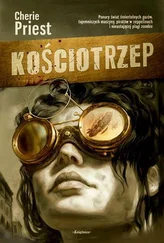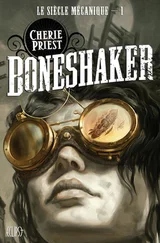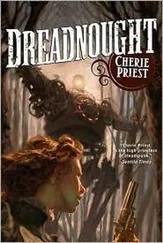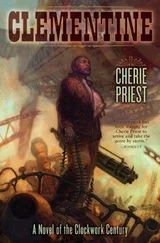“Yes, the marshal told me. They’re in Tennessee.”
“It’s less than ideal.” Lincoln spoke aloud what Gideon had privately concluded. “But it’s the best possible arrangement at this time. If they run, the bloodhounds will chase them, so I think we can all agree that they’re better off hiding until we know precisely what we’re up against. Now, Henry”—he shifted topics so smoothly, Gideon didn’t have time to offer some gentle agreement—“that telegram you sent was most alarming. I was hoping you could give us the particulars, and perhaps fill in some of the gaps between what we heard last week and your present understanding of the situation.”
“It might be best to wait for the Pinkerton agent. He’ll need—I mean, she’ll need—to be briefed, and she might have questions.”
A deep gong rang through the first floor, and Lincoln smiled. “A good suggestion, and good timing, too. I believe that’s her.”
Nelson Wellers reached one hand into his coat as if he did not share the former president’s confidence that this visitor was a fellow agent, not something more sinister; and Henry Epperson tensed as well. But within moments Polly returned. She was flushed, and glanced nervously between the newcomer and the men in the room.
“Gentlemen,” she said. “I … um. This is … this is Maria Boyd. She says she’s with the Pinkertons, and she showed me her badge … but…”
“But nothing,” Lincoln nodded reassuringly. “All’s well, Polly, thank you. Could you bring us another pot of coffee, please? Our guest might care for a cup. And, Miss Boyd—that’s your preferred address, isn’t it? Thank you for coming on such short notice.”
Stunned out of their usual manners, Nelson Wellers and Henry Epperson stayed in their seats for another awkward beat, then fumbled their coffee cups aside and rose as they recalled that standing was the usual protocol when a woman arrived. But Gideon Bardsley stayed where he was. He, too, was dumbfounded, but even once his shock passed, he had no intention of rising.
Maria Boyd, better known in the papers as “Belle Boyd,” was of average height, with posture that indicated good breeding. True to rumor, hers was the sort of body to launch a thousand ships: voluminous, shapely breasts and a narrow waist, graceful shoulders and a long, lean neck, but only the very kind or terribly nearsighted had ever described her plain, horselike face as “beautiful.”
She was no longer the hoopskirted coquette from the gossip pages. Now the notorious spy of yore wore something simple but more modern, a gray dress that was full only at the rear. Gideon was idly surprised to note that the Cleopatra of the Confederacy must have fallen on hard times—for he knew an oft-worn, insufficient article of clothing when he saw one; and her black cotton coat could not have been enough to keep her warm, even when augmented with a blue wool scarf that did nothing to mask the outstanding swell of her figure.
Calmly, deliberately, she unwound the scarf and unbuttoned her overcoat. “Gentlemen,” she greeted the lot of them, even catching Gideon’s eye in a pointed display of acknowledgment. “And Mr. President, of course,” she said to Lincoln. “‘Miss Boyd’ will be fine.”
But when she dipped her head to remove her scarf entirely, Gideon saw a large black comb. A mourning piece. Oh, yes, he thought. That’s right. Divorced, then later widowed. By a Navy boy, wasn’t that the story? But that had been years ago now. Considering that she’d offered them no married name, maybe she wore it out of habit, or for lack of other baubles.
Henry Epperson gave her a little bow and began to babble. “Miss Boyd, yes, Miss Boyd. I suppose that’ll keep things simple, won’t it? And I am sorry, ma’am—I don’t mean to be rude or strange, it’s just that I’m very surprised, you understand. I didn’t realize you were the agent they’d sent, that’s all. I just didn’t know.”
“There’s nothing wrong with being surprised,” she assured him. She held her scarf in her hands like Henry would’ve held a hat, if he’d still been wearing one. She held it between herself and everyone else in the room. “I was more than a little surprised when I was given this case, I don’t mind telling you.”
The marshal held out his hand as if to take her elbow and guide her into the room, but she was out of reach. She followed the gesture anyway, when he said, “Please, won’t you pull up a chair and join us?”
“Thank you, I believe I will. I’ve read the files and I think my information is up to date, but I expect there’s quite a lot we can learn from one another, mister…?” she prompted him.
“Epperson. Henry Epperson. Just Henry, really, if you don’t mind. Over there is Dr. Wellers—I mean, Nelson Wellers,” he said.
She nodded. “Another agent, Mr. Pinkerton told me.”
He nodded back and slowly reclaimed his seat. “That’s correct. It’s … a pleasure to meet you. I’d heard you joined the company a few months ago. Excellent work on that Clementine case, or so they tell me.”
“You’re too kind.” She accepted the chair Henry brought her and drew herself forward into the circle. Once settled there, with her scarf now draped over the armrest, she addressed Gideon directly. “And I suppose that makes you Dr. Bardsley, the inventor. I’ve read quite a lot about you. They say you’re a genius.”
Gideon rubbed his thumb against the rim of his coffee cup. “Of course they do.” Then he said to the former president, “Mr. Lincoln, I don’t care what kind of badge this woman carries these days; she was a Confederate agent—I mean really, for God’s sake, it’s the only thing anyone knows her for. That and a mediocre production of Macbeth. ”
Henry Epperson squeezed his coffee cup a little too tightly. “There’s no need to be rude, Dr. Bardsley.”
Lincoln said to the room at large, and to Maria in particular, “He’s often direct like that. It’s best not to take it personally.”
“She’s more than welcome to take it personally,” Gideon countered. “I intend it personally. She campaigned for my people’s enslavement—she was even a hero of the cause. I don’t want her help or need it. I’d never be able to trust it, if I took it.”
“Hero of the cause?” she repeated. “Dr. Bardsley, I was evicted from the cause because I loved the wrong man. So I lost my country and then I lost the man, too—on a Union submarine, might I point out.”
“All the more reason to doubt your sentiments,” he said flatly. “You have something to prove. Everything to prove, if you want your country back.”
“And what makes you think I do want my country back?” she snapped. “I left that whole ‘my country right or wrong’ business back in my first marriage, right along with ‘my husband right or wrong,’ and you can rest assured that the CSA wants no further dealings with me. Let me help you, Dr. Bardsley—let me help solve this problem your machine is so worried about.”
Nelson Wellers set his cup on the table beside the chair and put up his hands in a call for peace. “ Please, Gideon … the woman is here at Mr. Lincoln’s request, sent by Mr. Pinkerton himself. If they can trust her expertise, you may as well trust it, too.”
Henry pleaded, “Really, Doc. Give her a chance.”
“Dr. Wellers. Mr. Epperson,” Maria said firmly. “I am grateful for your confidence, but I understand Dr. Bardsley’s reluctance to have me here.”
“Somehow I doubt that.”
She jabbed back, “Do I understand it firsthand? No, obviously I don’t. And no one says you have to cooperate. You aren’t the first man to play rough because you can’t stand the sight of me, and you won’t be the last. But this is my job, and I’ll do it—with or without you. If you want to stand in the way of your own advocates, I suppose that’s your prerogative. If you’d like to find out what’s really going on here, then get on board and play nice.”
Читать дальше










